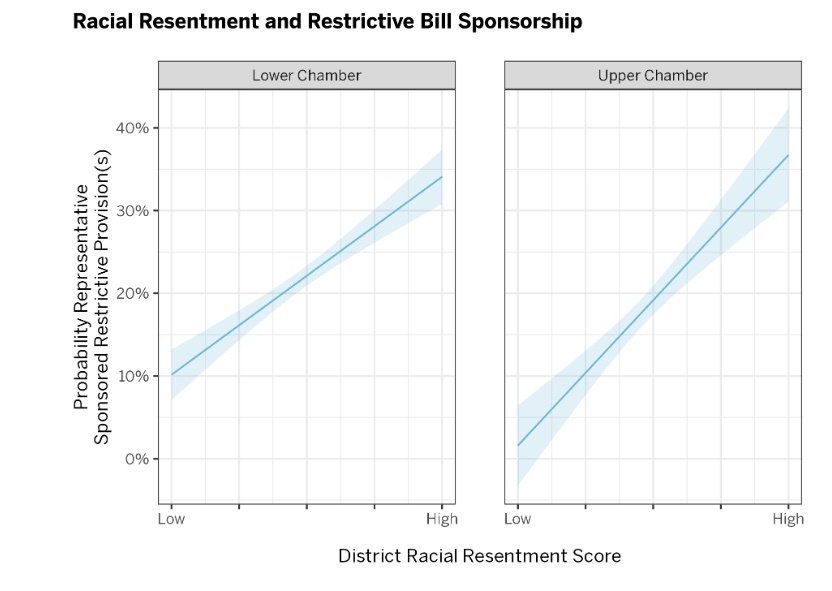Racial backlash drives restrictive voting laws, study finds

This graph featured in the Brennan Center's analysis shows that state legislative districts with higher racial resentment scores were more likely to be represented by a lawmaker who sponsored at least one bill with a provision that restricted voting.
In recent years, Republican state lawmakers nationwide have passed numerous pieces of legislation to restrict voting. As of May of this year, they've introduced nearly 400 restrictive voting bills in legislatures across the country, including in the Southern states of Alabama, Arkansas, Florida, Georgia, Kentucky, Mississippi, North Carolina, South Carolina, Texas, and Virginia. The proposals would, among other things, impose strict voter ID requirements, limit absentee voting, make voter registration more complicated, and allow aggressive voter roll purges.
Voting rights experts have noted that these policies disproportionately impact communities of color and would ultimately dilute the political influence of a diverse electorate. For example, studies have found that Black Americans and other voters of color are less likely than whites to have the proper paperwork to comply with strict voter ID laws.
GOP lawmakers argue such laws are needed to protect the integrity of elections. But a new report from the nonpartisan Brennan Center for Justice titled "Patterns in the Introduction and Passage of Restrictive Voting Bills Are Best Explained by Race" shows how racism has played a central role in the passage of restrictive voting laws.
Among the study's findings is that racially diverse states governed by Republicans are more likely to implement restrictive voting policies. At the same time, states with overwhelmingly white populations are unlikely to pass anti-voting measures, regardless of which party controls the legislature.
"The recent trend of restrictive voting laws lies at the intersection of race and partisanship," the report states. "We are not seeing these bills introduced and passed everywhere that Republicans have control. Rather, they are most prevalent in states where they have control and where there are significant non-white populations."
To consider the impact of race on restrictive voting laws, the Brennan Center researchers determined the racial composition of the districts represented by the bill sponsors, as well as that of their home states. They also used racial resentment responses from the 2020 Cooperative Election Study, a large-scale academic survey project that among other things assesses how white Americans think about the role of race in elections. Districts with higher racial resentment scores are more likely to feel endangered by the country's surge in racial diversity.
At the legislative district level, the analysis found, lawmakers from the "whitest districts in the most racially diverse states were the most likely to sponsor anti-voter bills." It also found that districts with high levels of racial resentment were more likely to be represented by lawmakers who support measures to restrict voting.
"Our research shows that racial factors were powerful predictors of sponsorship," wrote Kevin Morris, a quantitative researcher with the Brennan Center's Democracy Program. "This is consistent with the theory that 'racial backlash' — a theory describing how white Americans respond to a perceived erosion of power and status by undermining the political opportunities of minorities — is driving this surge of restrictive legislation."
The study was released ahead of the midterm elections in which communities of color will play a key role in determining which party controls the U.S. Senate and House of Representatives.
In 2020, more people of color turned out to vote than in any presidential election since 2012. But though there's been a surge in voter turnout among communities of color, racial disparities remain because of restrictive voting policies that disparately impede voters of color. For example, 70.9% of white voters nationally cast ballots in 2020, compared to only 58.4% of nonwhite voters.
In the last decade, the U.S. overall and the South specifically have become more racially diverse, according to the latest data from the U.S. Census Bureau. For instance, three of the 10 states with the highest diversity index in 2020 are in the South: Florida, Georgia, and Texas. All three of these states are also controlled by Republican legislatures that have passed harsh voter suppression laws that directly and disproportionately impact communities of color.
Tags
Benjamin Barber
Benjamin Barber is the democracy program coordinator at the Institute for Southern Studies.
